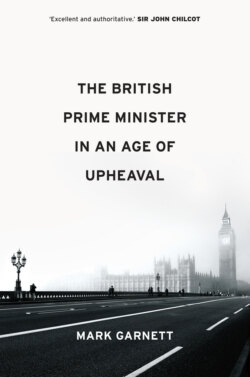Читать книгу The British Prime Minister in an Age of Upheaval - Mark Garnett - Страница 10
Rationale and structure of the book
ОглавлениеThe approach of this book reflects my view that attempts to draw on all of these sources, updated and reassessed at suitable intervals, can themselves serve as useful contributions to the subject, and that these exercises have been too rare. Ideally, books of this kind can be written in a way which informs the general reader as well as offering suggestions for students. The main purpose of this attempt is to provide evidence and analysis which allow all readers to draw their own conclusions about changes in the Prime Minister’s role since 1979. In the interests of brevity, and to de-clutter the text, I have tried to confine the references to occasions when particular works really need to be cited. The bibliography would have been much longer if it had included even a representative sample of the publications which have affected my views on this subject.
The remaining chapters of the book deal with various aspects of the Prime Minister’s role. The format is thematic, but within each of the themes the treatment is broadly chronological (normally beginning with Thatcher and ending with Theresa May – the early part of the Johnson premiership is discussed in the concluding chapter). There is no attempt to provide an exhaustive list of the Prime Minister’s resources, and some aspects of the position (e.g. its reliance in so many ways on prerogative powers, and responsibilities in relation to nuclear weapons) do not figure prominently in the discussion compared to the invaluable works of scholars like Lord (Peter) Hennessy (see, for example, Hennessy, 2000, 102–46). The primary focus of the present study is on the factors which have allowed Prime Ministers to retain so many of the duties and privileges once assigned to the monarchy, despite the subsequent introduction of democratic procedures.
With a structure which is chronological as well as thematic, the book can also serve as a history of UK politics since 1979 – albeit one which is skewed towards the prime ministerial perspective. This explains why devolution within the UK does not feature heavily – British Prime Ministers, including Blair, who oversaw the beginning of the process, have acted as if this constitutional development never happened. The reality, of course, is very different, and the divergencies between the various components of the UK have become increasingly important thanks to the 2016 referendum and the Covid-19 pandemic (which also revealed the centrifugal potential of directly elected Mayors, particularly in the north of England). My only excuse for adopting the prime ministerial perspective is that a separate full-length book would be required to do justice to the subject of devolution.
The composition of the book has coincided with momentous developments; indeed, it could be argued that the British public has been subjected to continuous upheaval since the financial crisis which began in 2007, giving it little chance to pause for reflection. Whatever challenges might come in the future, it is unlikely that the British political system will be capable of meeting them unless the prime ministerial role is reconsidered. H. H Asquith – who was well qualified to pass judgement – famously wrote that ‘The office of the prime minister is what its holder chooses and is able to make of it.’ The main conclusion of this book is that the one thing a contemporary Prime Minister cannot ‘choose’ to do is to make a success of the role, which has become increasingly dysfunctional along with the other institutions of Westminster and Whitehall. The only recourse for Prime Ministers who care for ‘the verdict of history’ is to fall back on a minimalist definition of ‘success’ – that is, in terms of victory in the next election, even if this is owed primarily to weaknesses or divisions among Opposition parties. For a healthy liberal democracy this would hardly suffice as a measurement of ‘success’: in particular, it implies that whenever the national interest conflicts with the electoral needs of the Prime Minister’s political party, the incumbent of No. 10 is now under overwhelming pressure to prefer the latter. The unsettling signs in recent years that British Prime Ministers have learned to accept this as their over-riding ‘performance indicator’ is one of the main motivations for this book about their role.
